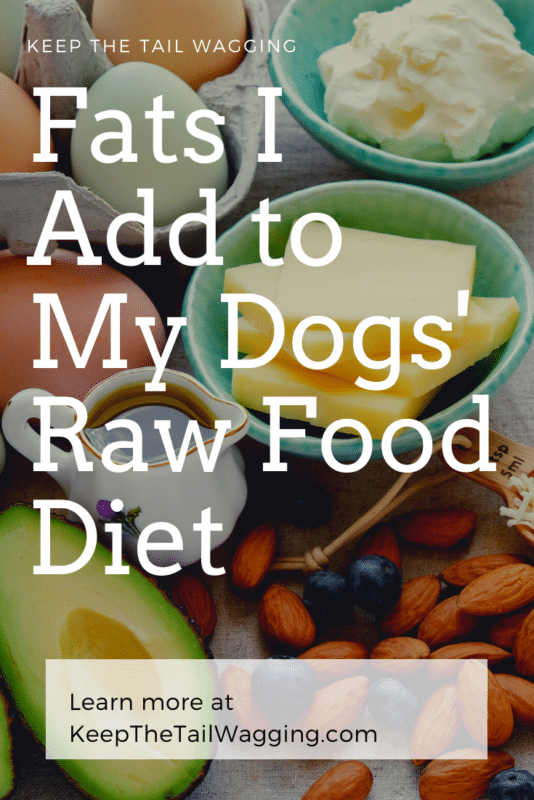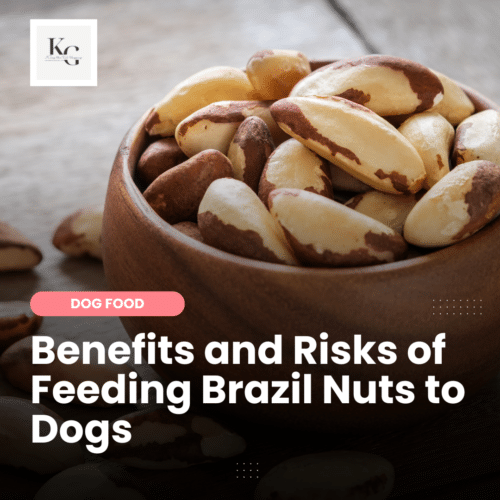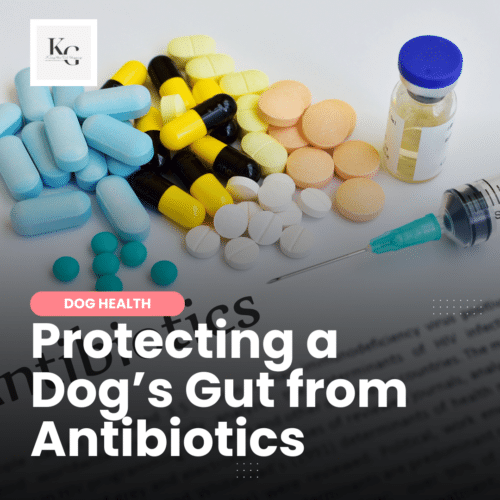Keep the Tail Wagging is supported by pet parents. I occasionally earn a commission (at no additional cost to you) when you click through an affiliate link to one of my favorite products. Thank you for your support. Read More
There was a time when people thought fat was bad, both for humans and dogs. And then someone, not sure who, said that our fear of fat is wrong. Fat doesn't make us fat, it's the DIET OF PROCESSED FOODS we're devouring daily and the TYPES OF FAT WE EAT that is making our obesity rates climb. And the same can be said for feeding healthy, uncooked fats to our pets.
Benefits of Fat in a Raw Food Diet
The myth that fat is the cause of obesity has been busted, but people are still afraid to add it to their dogs' diet because of the risk of weight gain and pancreatitis (discussed below). In fact, the only time I see people promote adding fat to the diet is when they're feeding their dogs a keto diet to starve cancer cells.
It took me a while to feel comfortable about adding more fat to the diet. But, over the years, I've learned about the benefits of fat and why it's a necessity for our dogs' diet.
- fat is a great source of energy; better than carbs and protein
- fat helps the system better absorb fat soluble vitamins
- fat helps dogs feel fuller for longer, which is why I feed it when a dog needs to lose weight
- fat helps to fight inflammation
- fat boosts the immune system
- fat supports cognitive (brain) health
- fat helps to boost the metabolism, keeping dogs at a healthier weight
When reading the benefits of fat for dogs, it's tempting to want to add loads to the diet, but in my reading, I've learned that fat should be 10% of a dog's diet. I don't spend time calculating this number. Instead, I make sure to add fat to their diet along with muscle meat, organs, and bone.
Fats I Add to My Dogs' Raw Diet
People are often surprised by the foods I add to my dogs' diet because when you look at many of the following foods, you don't immediately think “fat.”
- pasture-raised eggs
- raw goat's milk
- cow kefir
- fatty fish (primarily sardines)
- unsalted, grass-fed butter (KerryGold is my preference)
- coconut and MCT oil
- fermented fish stock/broth
I don't add these foods to my dogs' diet to increase the fat; each food has other benefits. More on this below.
Why Dogs Need Fatty Acids
Omega-3 fatty acids offset Omega-6 fatty acids. The Omega-6 fatty acids have their benefits, of course. However, one downside is that a diet high in Omega-6 fatty acids promotes inflammation – joint issues, skin issues, digestive issues, and inflammatory diseases. Adding a quality Omega-3 fatty acid source brings the fatty acids into balance while introducing an anti-inflammatory response.
Benefits of Omega 3 Fatty Acids
The reason why I make sure my dogs get plenty of Omega 3 fatty acids is that fish (and other sources of Omega 3 fatty acids) fights inflammation while supporting…
- heart health
- skin and coat health
- cognitive/mental health
- liver health
- gut health
- immune system
- puppy growth and development
Omega 3 fatty acids are also great for dogs with environmental allergies. Rodrigo is allergic to pine trees – guess what's growing all around us here in the Pacific Northwest – which makes it essential that I add foods that support the immune system while combatting allergies.
Benefits of Omega 6 Fatty Acids
Omega 6 fatty acids have gotten a bad rap because whenever we explain why so many dogs can't eat chicken, the answer is because of the high Omega 6 levels in processed pet food.
Omega 6 fatty acids are actually essential to the body, which means that we (humans and dogs) need to get them from our diet. In my reading, I learned that Omega 6 fatty acids provide energy and boost the immune system. Despite what I originally thought, Omega 6 fatty acids aren't bad for the body. Too much, however, will result in an overabundance of inflammation. This is where we see food sensitivities, joint pain, skin issues, and inflammatory diseases.
Sources of Omega-3 Fatty Acids for Dogs
When it comes to Omega-3 fatty acids, my dogs are covered. I currently add the following fish to their diet (not in the same meal):
- sardines
- mackerel
- salmon
- fermented fish stock
- fish oil
- pork brain (yes, I feed this to my dogs too)
This list used to include phytoplankton, but this doesn't provide enough Omega 3 fatty acids to meet a dog's nutritional needs.
Other Fats that I Add to My Dogs' Raw Diet (and Why)
Pasture-Raised Eggs: When I first started trying to add fresh food to my dogs' diet, I started with eggs because everyone said that they support skin and coat health. Well, that's just scratching the surface. I add eggs to three or four meals a week as a multi-vitamin, it's a great source of amino acids, protein, and supports heart health.
- Feeding Eggs and Eggshells to Dogs.
- Best Way to Cook Eggs for Dogs
- Can Raw Feeders Freeze Eggs for Their Dogs?
Kefir and Raw Goat's Milk: I add kefir and raw goat's milk (sometimes I combine the two) to the diet to support gut health. These foods are a great source of probiotics and, personally, I prefer my dogs to get their probiotics from fresh, whole foods instead of supplements. Although supplements work too.
Grass-Fed Butter: I feed grass-fed butter occasionally because it's a great source of Vitamins A and K and studies have found that it can help decrease the risk of diabetes and some cancers.
Fermented Fish Stock: In 2020, I stocked up on fermented fish stock (and fish bone broth) because these products are a huge part of my dogs' diet. Fermented fish stock is great for joint health, cognitive health, heart health, skin and coat health, gut health, and it boosts the immune system. Wow! See what I mean? It's a must.
Coconut Oil / MCT Oil: When I was new to raw feeding, I thought of coconut oil as an alternative to fish oil. I was wrong. Coconut oil brings an entirely new set of benefits to the bowls. A quality coconut oil boosts the metabolism, promotes skin and coat health, supports thyroid health, helps with yeast and fungal infections, helps dogs with gut issues, with a ton of other benefits.
- 13 Amazing Benefits of Virgin Coconut Oil for Dogs
- Coconut Oil for Dogs: Research Says it’s FANTASTIC!
- 22 Uses of Coconut Oil by Dog Moms
What About Pancreatitis?
A lot of people avoid adding additional fat to their dog's diet for fear of triggering a pancreatitis attack. This is a reasonable concern, but not one that I share. As I understand it, raw fats (as listed in this post) don't stress the pancreas. It's the cooked fats that we have to worry about. So I remove the skin when feeding cooked turkey or chicken to my dogs. I scrape off the fat that rises to the top as my bone broth cools. And, when cooking for my dogs, I choose low-fat meats and still drain any excess before feeding my dogs.
And, when it comes to coconut oil, it's important to know that this fat is processed faster in the system and doesn't require pancreas enzymes to digest. This reduces the risk of a pancreatitis flare-up.
Now, that being said, if a dog is prone to pancreatitis, I highly recommend doing your homework and speaking with a holistic vet (experienced in DIY diets for dogs) before adding additional fat to your dog's diet. Not because I believe that the fats are unhealthy; my recommendation will help you feel more confident about the choices you make for your dogs.
And, Finally, the Keto Diet
We can't discuss fat without talking about the keto diet.
I've fed my dogs a keto diet a few times but it's not something I do regularly because it's a lot of work if I want to do it right. My concern with feeding a keto diet is that many of the calculators I've found seem to be nutrient deficient because they call for a ground protein, one vegetable, chia seeds, and a fat. So, when I've fed a keto diet, it was with the goal of getting a dog diagnosed with cancer into ketosis to starve cancer cells.
A keto diet also helps with obesity, diabetes, and other auto-immune diseases. But it seems most people turn to keto to combat cancer.
Feeding My Dogs a Keto Diet
After my dog came out of remission, I switched him to a modified diet that is similar to keto: high fat, moderate protein, low carbs.
- AM Meal: I feed him his regular raw meal in the morning.
- Midday Snack: He might get a fat snack midday to deliver supplements – I alternate between unsalted grass-fed butter, coconut oil, ghee, and organic sugar-free peanut butter.
- PM Meal: I feed him 1 cup of raw goat's milk and/or kefir (I like to mix the two).
To confirm that a dog is in ketosis, I use a ketone meter and strips. I look forward to the day when this can be done without poking my dog to draw blood.
Easy Keto Recipes for Dogs
The best way to figure out an actual keto diet is to use a calculator. Keto Pet Sanctuary as a free calculator. I formulated several keto meals that are now on Patreon. You can gain access to them for as little as $1/month.
The following are recipes that I created using the Keto Diet calculator. Please keep in mind that these recipes are based on a 70 lb. dog and I'm sharing to show their simplicity. Here are three; there are several more on Patreon.
Keto Homemade Recipe with Coconut Oil
RECIPE 1 (one full day)
- 525 grams – 80/20 ground beef*
- 0 grams – coconut oil (the fat is in the beef)
- 126.6 g – broccoli
- 1 tsp per 40 lbs (dog weight) – chia seeds
- 1 tbsp to each pound of prepared food – seaweed calcium
RECIPE 2 (one full day)
- 525 grams – 80/20 ground beef*
- 0 grams – coconut oil (the fat is in the beef)
- 59.5 g – red cabbage
- 1 tsp per 40 lbs (dog weight) – chia seeds
- 1 tbsp to each pound of prepared food – seaweed calcium
RECIPE 3 (one full day)
- 525 grams – 80/20 ground beef*
- 0 grams – coconut oil (the fat is in the beef)
- 85 g – green beans
- 1 tsp per 40 lbs (dog weight) – chia seeds
- 1 tbsp to each pound of prepared food – seaweed calcium
*beef, chicken, lamb and other warming/hot proteins aren’t advised for cancer dogs. Beef is often listed as “neutral” and I think this is grass-fed beef. I believe that grass-fed/Grain-finished or grain-fed beef is warming.I’ll share all of the recipes in a separate post.


















Is there a formula for how much omega-3 to feed, based on weight or ratios? And if so, is that formula based on whole food sources or based on supplemental (oil) amount? Thanks!
Hi Kimberly. I have a papillon and a terrier mix and I always worry about the fish oil going bad because they are smaller. The longest fridge life is 6 months. Should I just rotate sardines and salmon? Should I give them a little at both meals?
I add a source of Omega 3 fatty acids to my dogs’ diet daily and I alternate sources weekly. This week, I’m adding salmon oil to their diet, last week it was carp.
How frequently will you feed fish on a weekly basis? Once a week? Every other day?